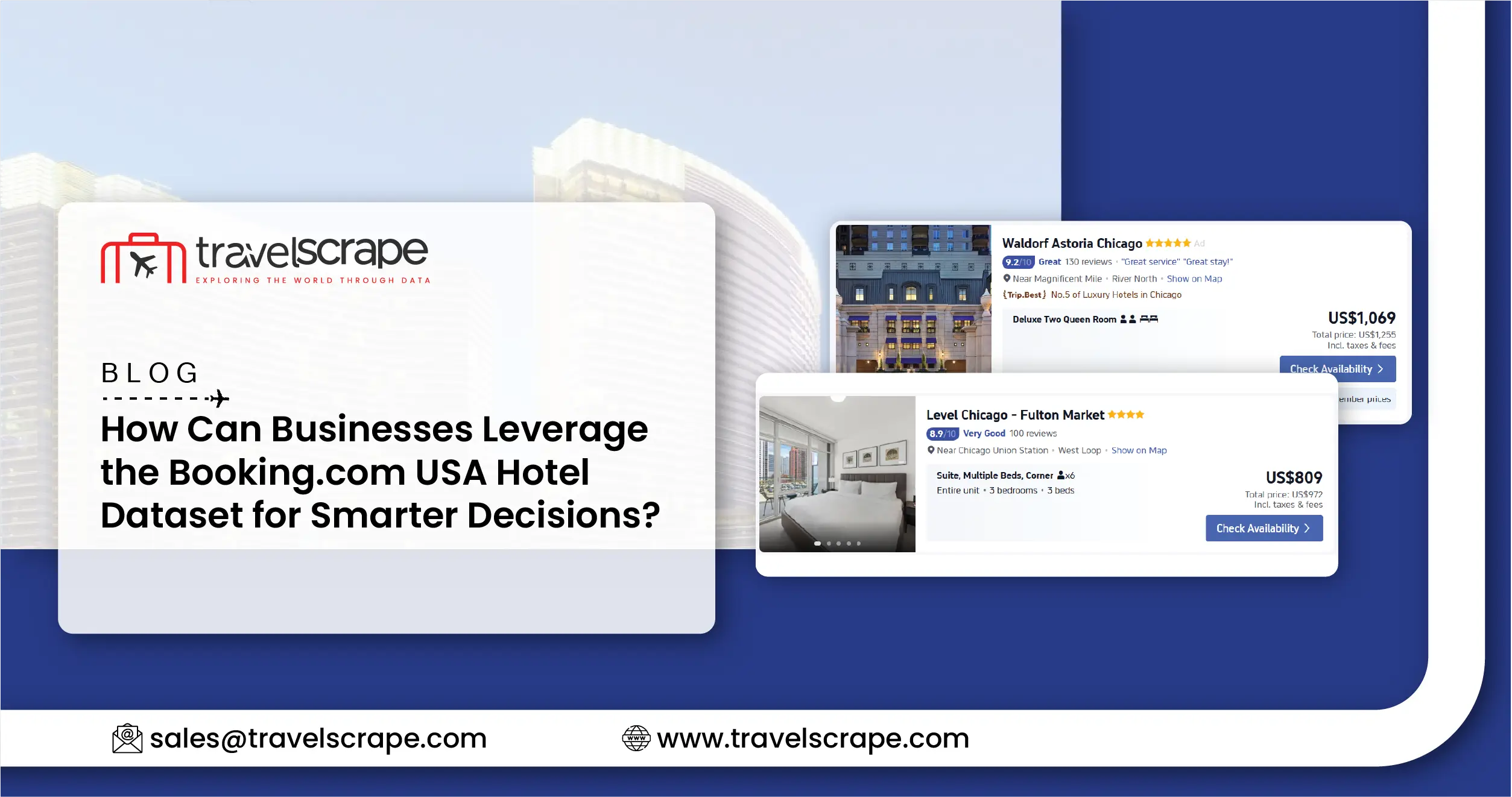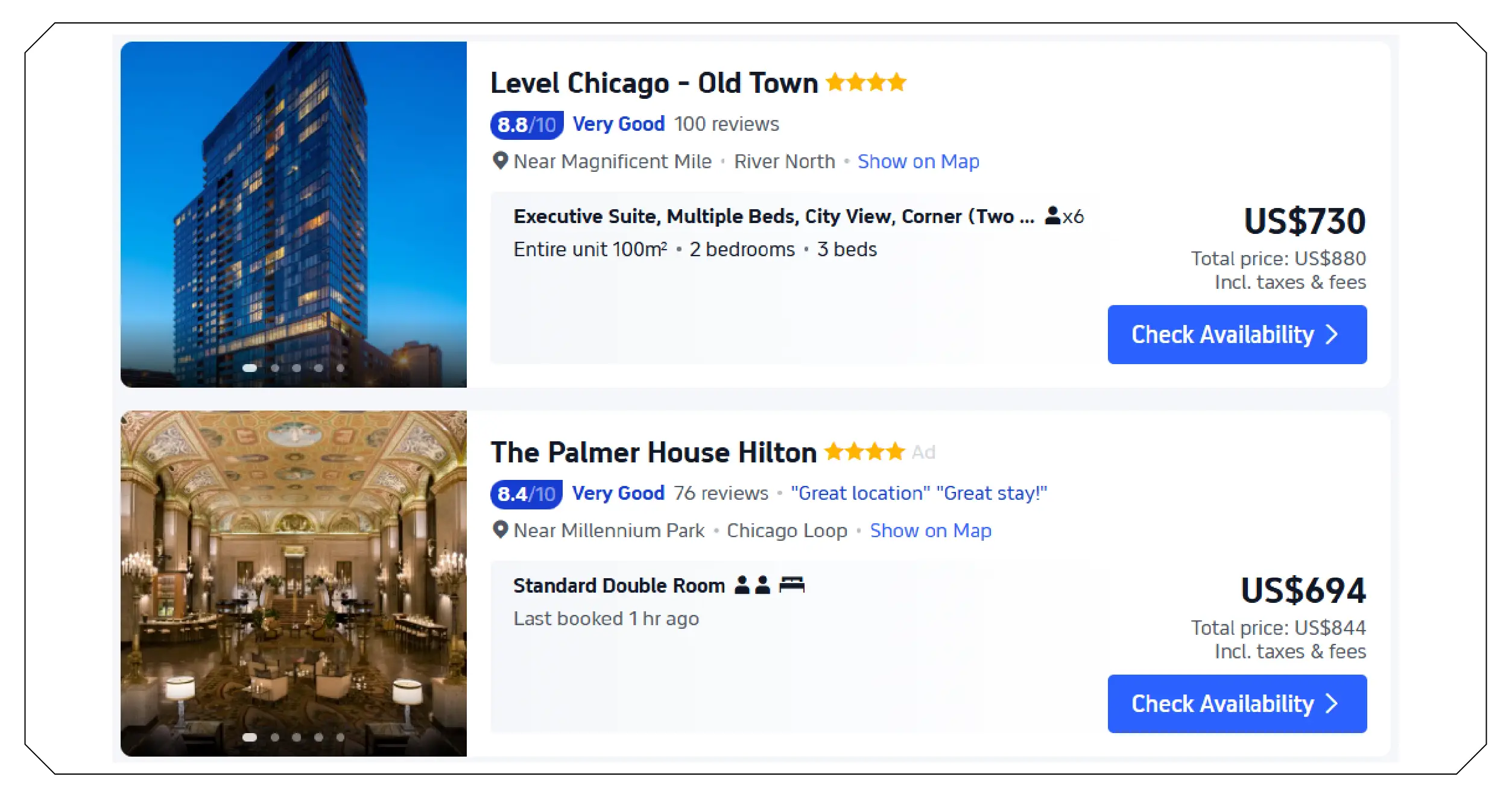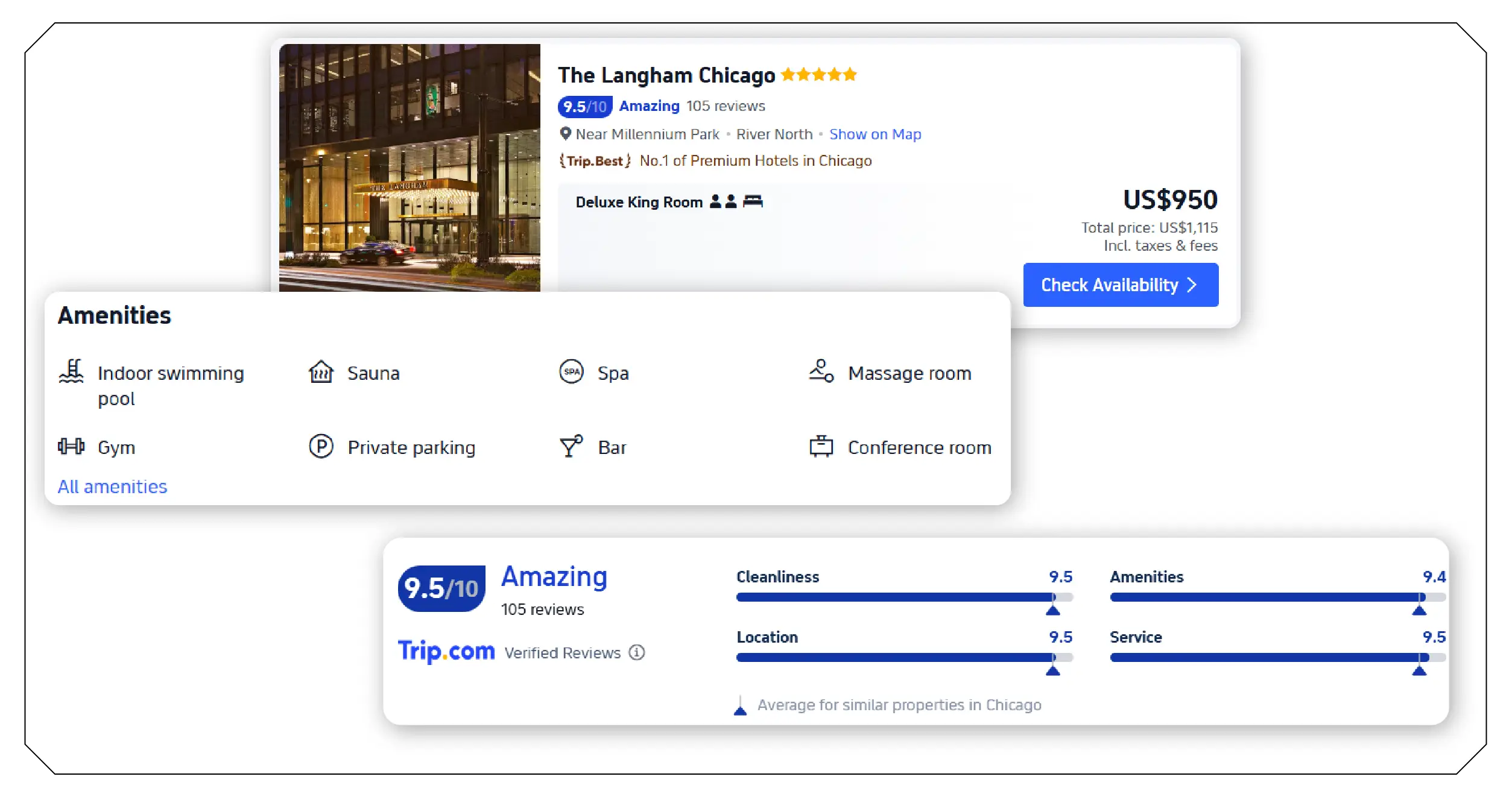How Can Businesses Leverage the Booking.com USA Hotel Dataset for Smarter Decisions?

Introduction
The U.S. hotel industry is evolving at a rapid pace, with increasing competition, shifting traveler expectations, and changing booking behaviors. In this environment, access to structured data is more crucial than ever. With the Booking.com USA Hotel Dataset, businesses gain a powerful resource for monitoring room availability, pricing changes, amenities, and guest experiences across thousands of hotels nationwide.
Equally important, the Booking.com Hotel Room Rates Dataset enables analysts and hotel managers to examine rate fluctuations in real-time and over historical periods. Understanding how prices vary by location, season, or event helps build pricing strategies that maximize profitability while still attracting customers.
To streamline this process, businesses rely on Booking.com USA Hotel Data Scraping, which enables the automated collection of structured hotel data, eliminating the inefficiencies associated with manual tracking. This ensures that every decision is backed by the most recent updates in the highly competitive hospitality market.
Why Hotel Data Matters?

Hotels face constant pressure to remain relevant, competitive, and profitable. Data provides the visibility required to make smarter decisions and adapt quickly to market changes. Whether it’s tracking competitor rates, understanding seasonal demand, or analyzing guest feedback, structured datasets help hoteliers identify opportunities and challenges.
The Booking.com Guest Reviews Dataset adds another layer of insight. By analyzing guest sentiment, hotels can discover trends in satisfaction, such as what customers value most (like cleanliness or location) and where improvements are needed (such as check-in times or breakfast options).
This combination of pricing, availability, and customer feedback data creates a holistic view of hotel performance that benefits not just individual properties but also travel agencies, researchers, and tourism boards.
Turning Data into Actionable Insights
Collecting raw hotel data is not enough. The real value lies in transforming this information into insights that drive measurable results. For example, by using Booking.com Hotel Dataset Extraction, travel companies can maintain accurate listings on their platforms, while hotels themselves can compare their rates against competitors with precision.
This process enables:
- Revenue optimization through informed pricing adjustments.
- Improved traveler experience by aligning services with customer expectations.
- Market forecasting by recognizing booking trends over time.
Automated dataset extraction ensures accuracy, timeliness, and scalability—making it possible to manage data at a level that manual collection cannot achieve.
The Importance of Price Monitoring
Pricing remains one of the most volatile aspects of the hotel industry, with rates adjusting daily and often multiple times within the same day in response to shifts in demand. By leveraging the Booking.com Price Trends Dataset , businesses gain visibility into these fluctuations, enabling them to detect seasonal surges, study competitor tactics, and measure the success of promotional offers with greater accuracy.
For example, hotels in Orlando frequently raise their prices during school vacation periods when family travel peaks, while coastal cities like Miami see rate changes tied closely to weather conditions and tourist seasons. Recognizing such recurring behaviors allows hotels, travel agencies, and revenue managers to plan, ensuring that pricing strategies align with customer expectations and market realities. By anticipating demand, businesses can maximize revenue opportunities, remain competitive against rivals, and improve traveler satisfaction through smarter, data-driven decisions based on real-world pricing insights.
Tracking Hotel Inventory Across the U.S.
Room availability is a central factor in effective revenue management, as hotels must consistently strike the right balance between occupancy and profitability. Travelers, on the other hand, expect agencies and booking platforms to provide accurate, real-time options when searching for accommodations. By using Extracting Booking.com Hotel Inventory USA, organizations can access structured insights into booking activity, such as which hotels are sold out, the average lead time for reservations, and regions with the highest levels of demand.
This type of information not only helps travel agencies deliver better service to customers but also allows hoteliers to anticipate demand patterns and adapt accordingly. When inventory begins to decline, hotels can dynamically adjust their rates to maximize revenue without risking underselling or overbooking. By understanding inventory trends in detail, businesses can maintain profitability, increase guest satisfaction, and build more efficient operational strategies in the competitive U.S. hospitality market.
Staying Competitive with Rate Monitoring
In today’s digital-first travel market, even small differences in pricing can sway a customer’s decision. With Booking.com hotel rate monitoring USA, hotels can stay one step ahead of competitors by tracking their pricing moves in real time.
This helps avoid two common pitfalls:
- Overpricing, which drives customers to competitors.
- Underpricing, which leaves revenue on the table.
By striking the right balance, hotels can maintain profitability while remaining attractive to travelers.
Who Benefits from Hotel Data?

The impact of hotel datasets extends across multiple industries:
- Hospitality brands: Benchmark property performance, compare competitive pricing, optimize revenue strategies, and maintain service quality consistency across portfolios.
- Travel agencies: Depend on accurate hotel pricing and availability to provide trustworthy booking options, enhance user experience, and strengthen customer loyalty.
- Tourism boards: Assess demand during festivals, conferences, and peak seasons, measuring campaign success and improving destination marketing strategies.
- Market researchers: Uncover consumer behavior trends, booking preferences, and spending patterns for sustainable growth strategies.
- Financial institutions: Analyze hotel datasets to design travel rewards, loyalty programs, and personalized offers aligned with travel habits.
These use cases highlight the far-reaching importance of Hotel Data Scraping beyond just hotels themselves.
Real-Time vs Historical Datasets
Both real-time and historical hotel datasets are valuable, though they serve different purposes. Real-time data enables hotels to respond promptly to competitive changes, while historical datasets provide a foundation for long-term planning and strategic decision-making.
For example, real-time monitoring may reveal that Las Vegas hotels are nearly sold out during a major event, while historical analysis confirms that this pattern occurs every year. Together, these insights help hotels prepare, adjust prices, and launch promotions at the right time.
Case Study Example
A mid-sized hotel in San Francisco wanted to compete against larger chains. After analyzing Booking.com datasets, the management realized their weekday rates were much higher than competitors, resulting in lower occupancy. By slightly reducing prices and offering complimentary services, they increased bookings by 20% in three months.
This example illustrates how structured hotel datasets directly translate into measurable improvements in performance.
Customized Data for Specific Goals
Not every organization needs the same type of hotel data. With flexible extraction methods, businesses can customize datasets:
- Hoteliers: Prioritize competitor benchmarking.
- Travel platforms: Focus on inventory accuracy.
- Tourism boards: Analyze region-specific demand.
- Researchers: Study long-term booking behaviors.
The Future of Hotel Intelligence

As digital transformation reshapes the travel industry, the next frontier is predictive analytics powered by structured hotel datasets. When combined with advanced machine learning models, these datasets enable businesses to forecast, personalize, and innovate in ways once unimaginable.
For instance, hotels and travel agencies can predict traveler demand months in advance, allowing them to prepare inventory, optimize staffing, and adjust pricing strategies before the market shifts. Predictive systems also enable businesses to personalize offers based on customer behavior, ensuring travelers receive relevant deals, packages, and loyalty rewards tailored to their preferences.
Another advantage is the capacity to model pricing sensitivity, helping hoteliers understand how different customer segments respond to rate changes and promotions, ultimately maximizing revenue without alienating price-sensitive guests. Furthermore, predictive analytics can highlight sustainable travel preferences, such as growing interest in eco-friendly hotels, energy-efficient properties, and green certifications.
This evolution creates a dual benefit: higher profitability for businesses and improved customer satisfaction, ultimately leading to a smarter, more sustainable future for the hospitality industry.
How Travel Scrape Can Help You?
- Customized Data Extraction – Collect hotel pricing, availability, amenities, and reviews aligned with business goals.
- Real-Time Updates – Continuous tracking of hotel rates and inventory for timely decision-making.
- Scalable Solutions – From a few properties to thousands nationwide, our scraping adapts to your needs.
- Clean & Structured Datasets – Delivered in ready-to-use formats (CSV, Excel, JSON, API) with proper categorization.
- Compliance & Reliability – Ethical scraping practices ensuring accuracy, reliability, and compliance.
Conclusion
Hotel datasets are shaping the future of the U.S. hospitality sector. They provide unmatched visibility into traveler behavior, pricing strategies, and availability trends, helping hotels and agencies remain competitive in a rapidly evolving marketplace.
By leveraging Web scraping Booking.com reviews and ratings USA, businesses uncover the emotional drivers of customer satisfaction. Through Scraping Booking.com hotel prices and availability across USA, they gain real-time insights into market dynamics. Finally, with Hotel Price Scraping from Booking.com USA , organizations can balance competitiveness with profitability, ensuring sustainable success in one of the world’s most dynamic travel markets.
Ready to elevate your travel business with cutting-edge data insights? Extract Aggregated Hotel Prices to identify competitive rates and optimize your revenue strategies efficiently. Discover emerging opportunities with tools to Extract Travel Industry Trends , leveraging comprehensive data to forecast market shifts and enhance your service offerings. Leveraging Real-Time Travel Mobile App Data help to stay ahead of competitors, gaining instant insights into bookings, promotions, and customer behavior across multiple platforms. Get in touch with Travel Scrape today to explore how our end-to-end data solutions can uncover new revenue streams, enhance your offerings, and strengthen your competitive edge in the travel market.